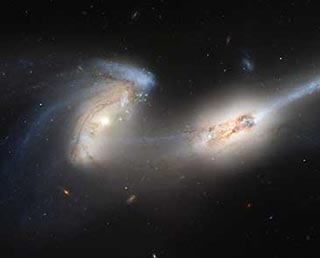Speaking of never-ending remakes, the worst fears of Star Wars fans have come to pass. As if the prequels weren’t snub enough, Lucas says he’ll NEVER release the original versions of the original trilogy on DVD. Which means, from now to time immemorial, Greedo shot first. Ugh…doesn’t Lucas even read the news?
Month: February 2003
Third Time’s the Charm.
Apparently Gus Van Sant is thinking of remaking Psycho…again. Very bizarre.
Lonesome Shadow.
The tracklisting for Counterfeit 2, Depeche Mode songwriter Martin Gore‘s second solo cover album, has now been released (07.02.03 story.) Longtime DM fans will know that the original Counterfeit EP, following up soon after 1989’s Music for the Masses, was a very worthy pickup. This one, due out April 28, includes more well-known tunes than the first, including songs by Brian Eno (“By this River”), John Lennon (“Oh My Love”), Willie Nelson (“Stardust”), and the Velvet Underground (“Candy Says”). DM frontman David Gahan also has a solo album coming out later in the year, which should be…interesting, I guess.
Treading Lightly Amid the Palmettos.
John Edwards and the rest of the Democratic field try to figure out how to manage the NAACP boycott of South Carolina. Sigh…between Bob Jones University and the Stars ‘n Bars, it’s always a bit embarrassing to hail from South Carolina in an election year. Hopefully a day will someday come when the post-Strom Palmetto State will finally get its act together.
100% Americanism, for better or worse.

Also on the history tip, I found this while preparing for my sections this morning on John Higham’s Strangers in the Land and nativism in the 1920’s: Red Scare: An Image Database…plenty of anti-foreign, anti-radical, and anti-union cartoons from the end of World War I. And, along the same lines, here’s an intriguing collection of WWI propaganda posters, such as this anti-German poster to the right. Very helpful in class, particularly as they will augur our reading of John Dower’s War Without Mercy later in the term.
You got to give for what you take.
I should have posted this a few weeks ago, but it’s been sitting forlorn in the bookmark section. Freedom: A History of US, the American history-for-kids site I helped build over the holidays, is now online. (I’m listed as a “history consultant…” woohoo!) Content that readers might find particularly interesting includes the quick historical primers I wrote for the teachers’ section and the many sound clips throughout of various celebrities portraying historic Americans (scroll down for a full listing.)
Chip off the old Block.
James Fallows on Bill Clinton on John Edwards, coming soon in The Atlantic Monthly. (In the meantime, you can peruse Fallows’ annotated version of Dubya’s State of the Union address.)
The Black Gate is Open.
Garth at Dark Horizons has an update on Return of the King with some good news for those miffed at the early end of TTT (Mild spoilers.): “ROTK is supposed to run in the 3.5-4 hour range, [and] P.J. can use as much time as he needs to finish the story.” Booyah…
Infinity and Beyond: The Case for Space
With the foam debris explanation suffering in computer modeling, the fate of the Columbia has become a scientific mystery. I haven’t had the time to address the space question as eloquently as I would have liked this week, so I’ll quit stalling and just repost some of my (slightly-edited) e-mail conversation with Scully on the subject:

I’m actually very much in favor of space colonization, and I think the argument that money spent on space is a senseless waste falls apart on its own premises. Would the money spent on the space program be better spent on conquering disease or ending famine here on Earth? Ideally, of course, we’d spend money doing both – exploring space and alleviating misery. But I think the utilitarian argument being made in this case ultimately doesn’t work. If we’re talking greatest good for the greatest number, then the space program in fact makes more sense. Spending the money on food saves millions. Space colonization would save untold billions, if not more – the very survival of the species, and in fact all of Earth’s species. We know that the sun will wink out of existence one day in the future, and if humankind isn’t out of the solar system by then, it’s game over.
Of course such an event seems very, very far away, and there are people starving and dying in the here and now. It seems callous to weigh the very real suffering of the diseased and famine-stricken against such a farflung possibility. But, the fact is, a wayward asteroid could kill us all in ten years. Or we could burn out the polar caps in one hundred. That’s why, ultimately, space colonization is an imperative. Having all of our eggs in one basket (Earth) may possibly encourage humanity to treat that basket with care (although there’s been no evidence of this in the past.) But even if we were all environmental saints, some forces are beyond our control.
If that sounds like idealistic or theoretical gobbledy-gook, I’ll go realpolitik. Like the Olympics, the Space Race is one of the few ways that nations can indulge in healthy, non-lethal competition (or indeed, even more healthier collaboration.) I’d rather China, the US, Russia, Europe, etc., spent billions on trying to be the first nation on Mars rather than on finding new and horrible ways to kill each other.
Also, as Screenshot recently noted, there’s a strong argument to be made for R&D benefits of the space program. Yeah, we all know about Homer Simpson and the ants sorting small screws in space. But there have been plenty of offshoots of NASA missions that have been enormously useful. And, while I admit this line of reasoning could be used to prove almost anything, scientific research conducted in space may yet provide breakthroughs that would help solve many of our planet-wide problems, from famine and disease to energy resources and environmental degradation.
And, finally, it would take a long time to explain in detail my final reason for being behind the space program, which is on republican (small R) grounds. But the Cliff Notes is this: I believe democracies need large civic projects to bind them together (usually, they have taken on martial rhetoric – War on Poverty, War on Drugs). The space program advances knowledge and brings Americans together in a way that doesn’t necessarily involve any enemy but ignorance. As such, it should be pursued if no other reason than that it encourages us to dream together and inspires us to collective action.
So, to sum up, I am very much in favor of space exploration and the space program. But I do agree with you that NASA has become a bit bloated and inefficient, and that’s for all the reasons that government always gets fat – for one, there’s no bottom line. For another, short-term thinking and narrow, remunerative interests have grafted themselves onto the system. Hence, we have a rocket-based shuttle launch system that costs ridiculous amounts of money each time we use it because the check-cashing subcontractors have no real incentive to start working on cheaper, lighter space planes. In fact, I think that it is in this regard that the tragic deaths of the STS-107 crew may not be in vain. The fate of Columbia is going to cause some heads to roll, and hopefully some of NASA’s organizational priorities will be reconstituted from the bottom up.

So that’ s my piece on the space program. Sorry if it’s more inarticulate than I would have liked. To close, I’d be remiss if I didn’t mention in passing at least one more reason I support the colonization of space. As Breaching the Web’s Wild West cartoon also suggests: Because it’s there. Strange and irrational as it might seem, it’s always been my dream to look back on Earth from the stars, and, for however infinitesimal and fleeting a moment, attempt to contemplate the striving of countless generations towards outer space. Call it a bias or a misplaced faith in progress, but I believe Humankind has a mission and a destiny to leave the cradle of Earth and to colonize other worlds, allowing all the weird, wild, and wonderful variations of human society to bloom and flourish across the cosmos.
Wildly idealistic and improbable as it might seem, this dream gives me hope. And when the Columbia splintered apart last Saturday, it wounded a portion of my idealism that even the unforgettable horrors of 9-11 couldn’t touch. Which is why I am moved to see in the wake of STS-107 that this dream is shared by many, many people, and that – despite the seven tragic deaths that day – the dream will continue.
He’s No Adlai.
Well, unfortunately I was in a class during Colin Powell’s presentation to the UN yesterday, so I can’t really attest to its effectiveness, although Saletan’s scorecard seems to suggest some minds were changed at the Security Council. (And the Guernica coverup, via Quiddity, made for some biting commentary on the day.) At any rate, it seems war is inevitable at this point…I only hope it was worth ticking off most of the international community to get our way.
